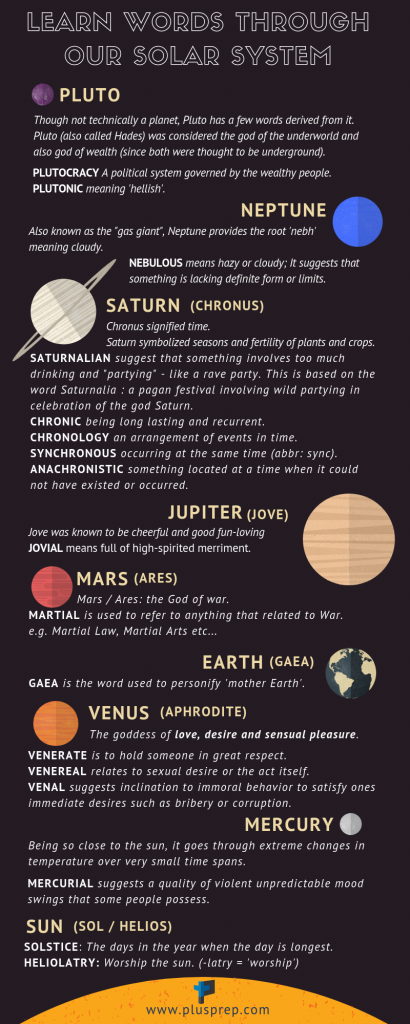Let’s face it: GRE vocabulary can be terrifying! You need to learn words you’ve never heard of before and the process of learning words can be quite painful and boring! This is why it’s important to learn words in a way that is both meaningful and fun. Etymology is a great way of doing this (check our article on How to build a killer words to know more), so too is the use of word themes to learn GRE words. In this article we will learn some words through GRE word themes; specifically words related to our solar system!

But the solar system as a GRE word theme? How does this work?
Numerous GRE words have Greek, Roman or Latin origins; Many specifically have their origins in ancient astronomical concepts and mythology (since those were closely related to each other). Because of this, many themes of words exist that have direct relationships with mythology and astronomy. Our Solar System, for instance consists of celestial bodies (planets and such) that epitomized the Greek and Roman gods of old. The qualities that these gods possessed, in most cases, evolved into more complex words in modern use! Let’s look at some examples and learn words through GRE Word themes.
Mercury
The messenger god also called Hermes, Mercury was considered a hot headed, moody and unpredictable character; not dissimilar to the planet itself. It constantly changes from extreme hot to extreme cold temperatures over a very short time.
1.Mercurial: to be susceptible to sudden and unpredictable changes in mood.
Venus
The goddess Aphrodite is also called Venus. She was the goddess of love, desire and sensual pleasure. The word ‘aphrodisiac‘ comes from this greek name of Venus.
2. Venerate (v): to venerate someone is to adore them and show desire for them through respect. This word shows that you are absolutely filled with respect for someone to the point that you almost worship them!
3. Venal (adj): a person who is likely to behave in immoral ways to satisfy their immediate desires and pleasures can be called venal. For instance, someone who is likely to take bribes; some one is corrupt can be called venal.
4. Venereal (adj): as in a venereal disease; these relate to sexual desire or the act itself. A venereal disease is a STD.
Mars
Also called Ares, Mars was considered the god of war.
5. Martial (adj): Related to war. e.g. martial law, martial arts…
Jupiter (Jove)
Jupiter, also known as Jove, was considered the head-god. He was characterized, in some mythologies, as a cheerful and fun-loving being. This dictates the meaning of the following word.
6. Jovial (adj): Full of or showing high-spirited merriment.
Neptune
The planet Neptune is called the “gas giant”. So too is the mythological figure Poseidon (Greek version of Neptune) the god of seas, rains and other nautical things. The root word “nebh-” is derived from this and means “cloudy”.
7. Nebulous (adj): to be hazy and unclear; lacking definition or definite content
Saturn (Chronus)
Saturn season, harvest, and fertility. Chronus symbolizes time.
8. Saturnalia (n): a wild gathering (party) involving excessive drinking and promiscuity. This originates from the Greek pagan festival in celebration of Saturn and involved wild partying, immoderate drinking and promiscuity.
9. Saturnalian (adj): relates to something that is characterized by immoderate drinking, wild partying and promiscuity.
10. Chronic (adj): being long-lasting and recurrent or characterized by long suffering.
11. Chronology (n): a record of events in the order of their occurrence
12. Chronicle (v): record in chronological order; make a historical record.
13. Chronicle (n): a record or narrative description of past events.
14. Synchronize (v): arrange or represent events so that they occur at the same time / together. Abbr – sync.
15. Chronograph (n): a device used to measure time accurately, to minute measurements.
16. Anachronism (n): Something located at a time when it could not have existed or occurred.
Pluto
Though not technically a planet, Pluto has a few words derived from it. Pluto (also called Hades) was considered the god of the underworld and also god of wealth – since it was believed that both the underworld and all the riches (gold, diamonds etc..) were found below the earth.
17. Plutocracy (n): A political system governed by the wealthy people.
18. Plutonic (adj): meaning ‘hellish’.
If you liked reading this article, we recommend the following

